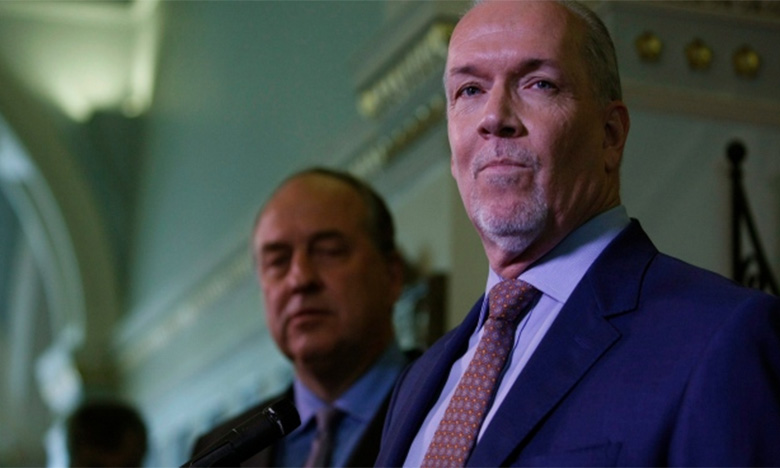When the leaders of British Columbia's NDP and Green Party stood before the microphones in Victoria on Monday to say they'd reached a deal to join forces, the reverberations were felt clear across the country, on Parliament Hill.
While the deal won't be finalized until later today, it could spell an end to Christy Clark's chances of holding on to power before she can even introduce a throne speech that might take into account the priorities of the province's three Green MLAs, on things like political finance reform, more affordable housing and funding for clean technology.
"The reason we are standing here today instead of waiting for a throne speech to be put forward is precisely to give British Columbians certainty," Green Leader Andrew Weaver told reporters.
Here's why.
Both Weaver and NDP Leader John Horgan oppose the expansion of Kinder Morgan's Trans Mountain pipeline between Edmonton and Vancouver. Their accord comes just a day before the company is to make its initial public offering for shares in the $7.4-billion project.
The federal Liberals approved the expansion in November as part of a strategy to get Alberta's NDP government to introduce a price on carbon. One depended on the other.
"The prime minister's been clear that, without a climate plan, we can't get a pipeline, and without a pipeline, we can't get a climate plan," one Liberal insider said Monday as government officials met behind closed doors to craft strategy.
A PMO statement issued hours later was more anodyne.
"As the prime minister has said in the past, Canada has strong institutions at the federal and provincial level that are able to work through complex situations."
This, apparently, qualifies as one of those complex situations.
Pipeline politics revisited
The truth is the Trudeau government worked hard just to get Clark's Liberal government on board with the Kinder Morgan expansion, even though the province has had a carbon tax for years.
First, Trudeau's government approved the Site C hydroelectric dam despite significant opposition from area residents and First Nations. Then, in November, Ottawa gave the go-ahead to an $11.4-billion liquefied natural gas project in northern B.C.
Both projects remain central planks in Clark's economic plan for the province — and in her election campaign.
Today, the future of all of those projects is less clear than yesterday.
"I believe, firmly, that all these approvals were part of a political trade-off Justin Trudeau didn't need to make to keep Christy Clark happy and to keep Alberta Premier Rachel Notley happy," said federal Green Leader Elizabeth May.
"It's the kind of unprincipled set of trade-offs that causes disillusionment with politics."
So what's next? In Kinder Morgan's case, the province of B.C. still hasn't issued all the required permits. An NDP government, supported by the Greens, presumably won't feel the need.
Or this new government could order a provincial environmental assessment of the project — something the Clark government didn't do.
"Our objective as we form a government is to ensure that we keep the economy going and that we prepare for the economy of the future," Horgan said Monday.
"That's the exciting part about looking at our two platforms together, and bringing them together in the form of this agreement on key issues we can absolutely agree on: to grow the economy, to create the economy for the future, as well as making sure foundational industries, like forestry, are front and centre."
Neither Horgan nor Weaver said a word about energy being a foundational industry.
Environmental groups noticed: The Pembina Institute, Clean Energy Canada and Stand.earth all released statements not long after Monday's news conference, hailing the NDP/Green accord as a positive step for clean growth and a greener energy future.

